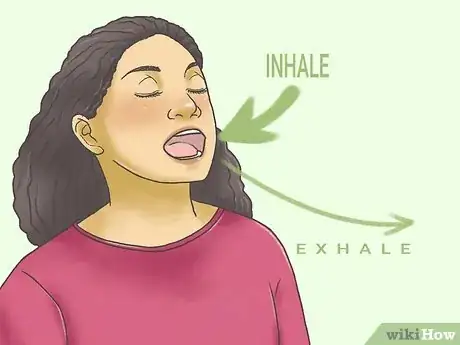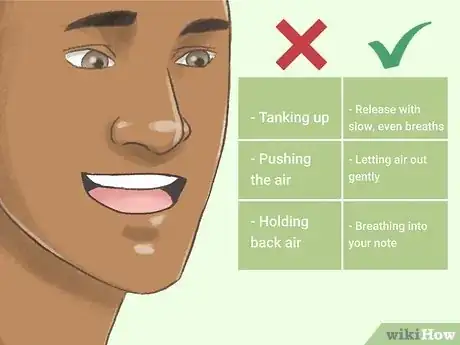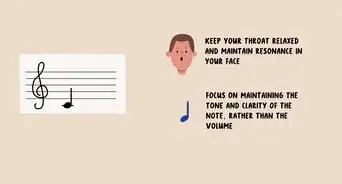This article was co-authored by Tanisha Hall. Tanisha Hall is a Vocal Coach and the Founder and Executive Director of White Hall Arts Academy, Inc. an organization based in Los Angeles, California that offers a multi-level curriculum focused on fundamental skills, technique, composition, theory, artistry, and performance at a conservatory level. Ms. Hall's current and previous students include Galimatias, Sanai Victoria, Ant Clemons, and Paloma Ford. She earned a BA in Music from the Berklee College of Music in 1998 and was a recipient of the Music Business Management Achievement Award.
wikiHow marks an article as reader-approved once it receives enough positive feedback. This article received 11 testimonials and 100% of readers who voted found it helpful, earning it our reader-approved status.
This article has been viewed 290,915 times.
There are many different ways to sing, from classical to growling, but the style that most people are familiar with is pop. This article will provide some tips and exercise to help you sound more like pop icons such as Beyonce and Mariah Carey.
Steps
Developing Your "Pop" Voice
-
1Set a goal for your voice. Pop singers have a large amount of variability and tones, from traditionally beautiful singers like Adele up against modern, more unique voices like John Mayer or Bruno Mars. Think about the songs you love and want to sing: do you want to work on epic, dramatic songs or more fun, loose bits.
- What does your natural singing voice sound like? Try to use this to your advantage instead of fighting it. Mick Jagger doesn't have an amazing voice, but he and the Rolling Stones rode the top of the pop charts for decades because he uses his growly, high-energy style to it's fullest potential.
- Singing like Adele, Beyonce, Michael Buble, and other "classic" voices generally takes years of training. While you can learn without a teacher, these voices are very hard to develop without professional help.
-
2Practice singing your favorite songs, recording and playing back the tracks. Your voice sounds different to others than it does to you, and you need to hear both versions to find out where you miss notes or need improvement. Make sure you turn down the background music as much as possible, as the original singer can cover up your mistakes if you're not careful. Listen to the recordings, then work on trouble areas until you can sing them fluidly.
- Sing whatever you want to sing -- there is no "right" style for pop singers.
Advertisement -
3Sing songs within your range, or comfort zone. Your range is the group of notes you can hit comfortably without cracking or missing notes.[1] A large range covers both high and low notes, like Marvin Gaye's famous 3-octave range. A small range sticks to simple, easy notes, like Joe Strummer's infamous 3-note range. Any range can work in pop music, but only if you know yours and know how to stay in it. The better your singing technique, the better your range.
- Hit your highest notes without cracking or struggling -- this is the top of your range.
- Hit the lowest note you can -- this is the bottom of your range.
- Practicing can expand your range. Working on higher and lower notes will pay off, as you can teach yourself to grow your range with proper technique.
-
4Stay hydrated and avoid smoking and alcohol before singing. Vocal chords are living cells and need to be healthy to perform well. As such, proper hydration is one of the small, secret keys to unlocking your best vocal potential. Furthermore, alcohol, tobacco, and even dairy products will hamper your chords ability to move freely, limiting your range.
- Make sure you start drinking at least 30 minutes before performing so that your body has time to absorb the water.
Learning Proper Singing Technique
-
1Stand upright, with your head up, chest out, and joints relaxed for the best singing posture. A tall, open posture is key to unlocking your best singing voice. Practice in front of a mirror, looking from the front and side, to make sure you're up straight and following the best posture guidelines:[2] Remember:
- Shoulders back.
- Chin level with the floor.
- Chest out.
- Stomach flat.
- Joints relaxed.[3]
-
2Focus on moving air from your chest while singing. You should feel pressure in your chest, as if you voice is coming from your pec muscles, instead of your head or neck. When you sing in your "head voice," you can feel your voice up in your throat and head, as if there was a little vibration there. Work on "moving" this vibration around, playing with your voice until you feel it in your chest. This is the feeling you want when singing.
- You want to move air from your diaphragm, not your throat, head, or mouth.
-
3Use your abdomen for breathing, moving air through the belly. When you breathe, breath "horizontally," with your stomach moving out as you inhale and in as your exhale. Working from your belly keeps your chest steady and helps control your air.[4]
- Imagine you're wearing a belt around your belly. As you inhale, it slides down to make room for more air. As you exhale, it slides up your belly to move air up through your chest and out your mouth.[5]
- In "normal" breathing, your chest moves. But singers need a solid, unmoving chest to keep a steady stream of air coming.
-
4Focus on deep, even streams of air to control your breathing. Regular breathing is short and shallow -- as you rarely need a ton of oxygen. Singers, however, need to save their air to sing with. To do so, focus on big, quick inhalations and slow, even exhales. As you sing, you want to imagine one continuous, unchanging stream of air coming out. It takes work, but this is perhaps the single best thing you can do to become a better pop singer.
- When inhaling, think of just opening your whole throat to let air in, instead of trying to suction it in. It is much more effective this way.
-
5Keep your eyes and ears out for common breathing mistakes. The sooner you notice these issues and fix them, the faster you'll learn to sing any genre effectively. Each of these issues is likely something you've done or felt yourself doing because they feel like good ideas. However, you'll notice the difference once you make corrections.
- Tanking up: This is when people try to fill their lungs extra big. But better singers just release their air with slow, even breaths to make their air last longer, not fill up with more of it.
- Pushing the air: You want to think of "letting" the air out gently, not forcing it.
- Holding back air: Think of how a car jerks right when you hit the gas. This is when a singer stops their voice right between inhaling and exhaling. You want to work on breathing “into” your note, silently exhaling air quickly just before starting to sing so that the note slides out smoothly.
Practicing to Improve your Voice
-
1Warm-up before singing, always. Your vocal chords are similar to muscles, and they need to be loose and warm to stretch to their fullest. Never go into a song or show without at least 5-10 minutes of simple exercises, like these:
- Hum. Humming activates your breath without straining your vocal chords.[6]
- Trill your lips and tongue to warm up your mouth and jaw (ie. roll your r’s)
- Begin with a simple scale, going up and down slowly (doh – mi – sol – mi – doh).
- Begin with the easiest songs you are going to practice, waiting 10-15 minutes to tackle the tougher parts.
-
2Open your mouth wide for notes in the low register. When singing in a low register, make sure you sing with an open mouth. Practice in front of a mirror to make sure you're doing this. Don't force your voice, but sing with abdominal support throughout. To strengthen your low register, exercise using a descending scale, repeating and descending semitone by semitone.
- If you don't know scales, practice with the classic "Do-re-mi-fah-so-la-tee-doh," lowering your voice at each interval. You could also simply pick a phrase, like "la la la la" to work through.
-
3Lift your cheeks and push from the throat and nose to hit higher notes in the register. When singing in a high register, smile and lift your cheeks. Imagine the sound is coming from the space behind your nose, and try to produce a sound like a witch's cackle. Exercise using ascending scales, placing an 'n' sound in front of a vowel. The 'n' will help push the sound into your high register.
- Practice songs you like that hit this high register. Lower the background music so you can really hear yourself and know if you're actually hitting the notes cleanly.
-
4"Belt out" big notes by building strength and comfort in the high register. Singers like Ariana Grande, Celine Dion, Beyonce, Mariah Carey, and Christina Aguilera will often belt out their top notes. Belting is essentially a form of shout-singing. When belting, support your voice by holding in your abdominal muscles and sing in your high register rather than pushing up from the bottom of your voice.
- Belting out big notes takes practice. Keep working on hitting normal high notes cleanly, then practice these bigger notes at shows or when you feel comfortable. They will come.
-
5Consider learning a piano or guitar to accompany yourself, or join a band. Pop singing is actually as much about the vocals as the performance. If you want to learn to sing pop songs, you'll need to get out there and really start singing pop. You'll have far more opportunities if you can play an instrument too, or have instruments behind you.
- When singing pop, use the mic to your advantage. If you think you're about to miss a note, lean back "dramatically," away from the mic. Need a little more volume, a growl, or some distortion -- get right into the mic and or cup it with your hand while singing.
Community Q&A
-
QuestionWhat if I'm shy?
 Foxstar504Community AnswerSing in a mirror, then maybe sing in a small group, and increase that group over time to get more comfortable.
Foxstar504Community AnswerSing in a mirror, then maybe sing in a small group, and increase that group over time to get more comfortable. -
QuestionHow can I improve my high register singing?
 Community AnswerYou could work on the highest note that you can reach and keep working up from there. Having a teacher is a good idea, or at least someone trained and helpful.
Community AnswerYou could work on the highest note that you can reach and keep working up from there. Having a teacher is a good idea, or at least someone trained and helpful. -
QuestionWhat if nobody supports my dream? I'm scared to tell people.
 Abinash DewrajaCommunity AnswerWhy are you afraid? Do you think you will achieve your dream without supporting people? Achieving your dream is the result of overcoming your fears and obstacles.
Abinash DewrajaCommunity AnswerWhy are you afraid? Do you think you will achieve your dream without supporting people? Achieving your dream is the result of overcoming your fears and obstacles.
Warnings
- Be careful with your voice! If you push it beyond what it's ready to do, you could damage it. Be especially careful with belting. It can be dangerous.⧼thumbs_response⧽
- If you have a sore throat don't sing too much because you could damage your voice. Take a drink of water and relax your voice.⧼thumbs_response⧽
References
- ↑ Tanisha Hall. Vocal Coach. Expert Interview. 27 March 2020.
- ↑ http://cmed.faculty.ku.edu/gummposture/posture.html
- ↑ http://www.vocalist.org.uk/posture_exercises.html
- ↑ http://www.vocalist.org.uk/breath_control.html
- ↑ http://www.bbc.co.uk/sing/learning/breathing.shtml
- ↑ https://www.schoolofrock.com/resources/vocals/9-best-vocal-warm-ups-for-singers










































































